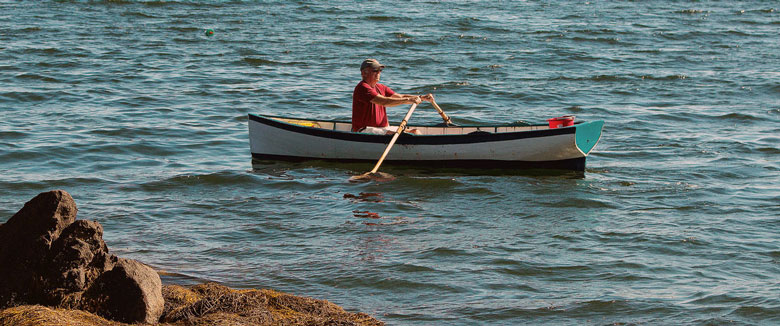“The best things in life are free,” the saying goes. It’s true, in my experience— good friends, nice weather, positive experiences, great memories, the beauties of nature. I could go on, but you should draw up your own list of freebies.
Boats are an exception, you might think. They can cost you big bucks; “holes in the water into which you pour money” is one way to put it. “B.O.A.T.—Bring Out Another Thousand,” is another saying I’ve quoted myself.
But experience, that greatest of teachers if you let it, and if you’re lucky, can bring you to an entirely different conclusion: that the best boats are free.
I should know because over the years I’ve had several. Way back in the last century when I was about 10 years old, I discovered the pleasures of a wonderful-smelling old rowboat under our summer cottage. It had been there off and on for a very long time, painted (or not), launched into and hauled out of Penobscot Bay since my grandparents’ day.
Down I drove to find my boat with a hole in the bow—above the waterline, but big enough to declare my boat a total loss.
With help from parents, older siblings, and others, it got launched and moored again. In it, with the help of others, I learned to row. The experience and the boat were free to me, at least, and together they changed my life. I know that today because I’ve been rowing ever since.
The next free boat came along a couple of years later in Columbus, Ohio, where my father and I built a Penguin-class sailboat from a kit. The job took us two years and messed up our family house there (our shipyard was on the porch and the boat’s bow stuck into the living room, where Mom would drape something over it when she entertained). Pop and I persevered, and eventually we launched our creation and went sailing.
The whole experience, again free to me at least, was transformative. I’ve been an amateur boat builder and sailor ever since. I still have clamps and other tools Pop procured for that project.
Then my brother and I, perhaps inspired by the Penguin, put together a second kit—an 8-foot pram, painted bright red, for use as a tender for a sailboat we chartered in Maine one summer. Success brought more boat time, again (in my case) free.
More life lived, more free- or nearly-free boats. Still in Ohio, a wood Comet sailboat that had belonged to a friend of my father’s, in need of new decks and a paint job that I did, gained me access to it once the work was done. I sailed that boat for several seasons at no cost to me but my time.
In Maine, I won a Puffin fiberglass dinghy as a door prize at the then-new YMCA in Freeport. I swam at the Y for years afterward, and row or tow that little boat to this day.
Then, tragedy with a silver lining: one day in Yarmouth, I got a phone call from the Falmouth harbormaster reporting that a sailboat (not free) I’d moored there had been damaged when another boat dragged into it. Down I drove to find my boat with a hole in the bow—above the waterline, but big enough to convince a surveyor and my insurance company to declare my boat a total loss.
I had to give up the boat to get the payoff, of course, but to this day I think I’m the only skipper in history to have made money on his boat. I took the money and went shopping for the boat I’d always coveted: something big and seaworthy enough to sail to Florida, perhaps beyond. The extra dough sloshing around in my pockets, plus a loan, got me Karma, the Sparkman & Stephens 40-footer aboard which I eventually made my Big One. Karma may not have been free, but she freed me.
Back from a months-long cruise during which I met the woman who’s now my wife, I eventually put the proceeds from Karma’s sale into a house project and became—but for my free dinghy and the old rowboat in Penobscot Bay—boatless.
You’ll perhaps recall the Viking proverb “bound is the boatless man.” Given that I’m me, that sad state didn’t last long. A friend who’d heard I was beached offered me a new boat project, free of course. Gift is what I named the hulk I hauled out of my friend’s driveway.
This boat, a small wooden sloop, had sat just long enough in a derelict state to need everything: deck beams, decks, centerboard trunk, some ribs, a mast, and a paint job… you name it, I did it. For free. Lots of fun, a great exercise in boatbuilding. I enjoyed every minute and even went sailing a few times. I did get tired of pumping and bailing due to Gift’s leaky seams, and eventually I sold her.
I built a Gloucester Gull dory from plans (free) and rowed it before giving it to my granddaughter. I then bought a sailboat kit (not free) and assembled it for my grandson.
Two free or reduced-price boats to go: a Jarvis Newman rowboat in need of repairs that I’ve fixed up and still row regularly with a new pair of oars I made from plans in WoodenBoat magazine. And a Cape Dory Typhoon I bought as a refinished hull and a pile of parts at a bargain price.
For the past two summers, Right Now and Hot Sauce have constituted my fleet. Both perform well, extremely well if you consider what I paid for each. Free or nearly free—to me at least—seems a reasonable way to think about boats.
David D. Platt is a former editor of The Working Waterfront





